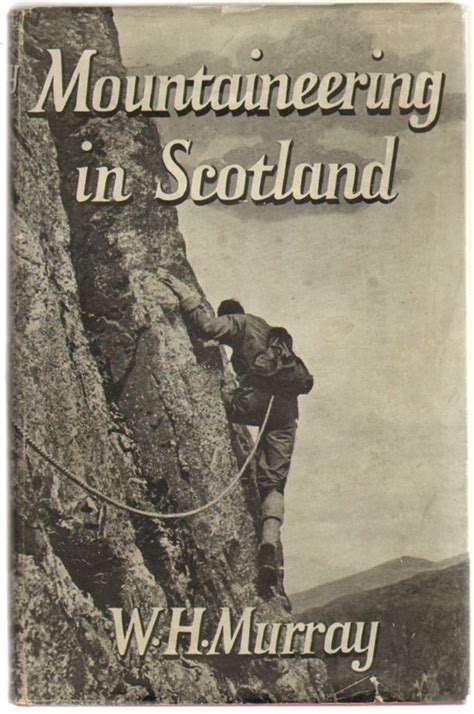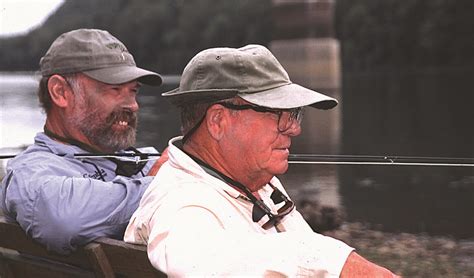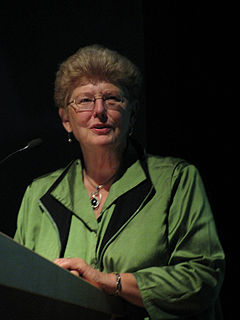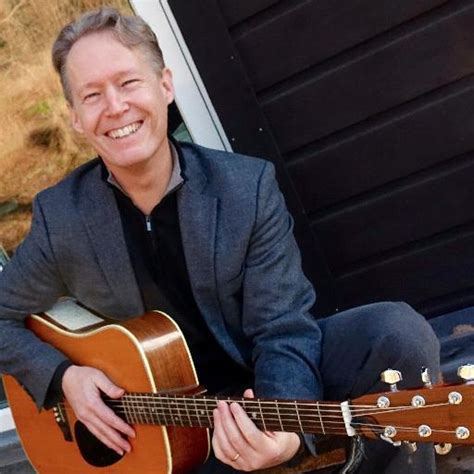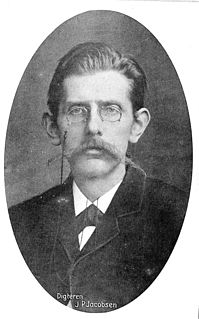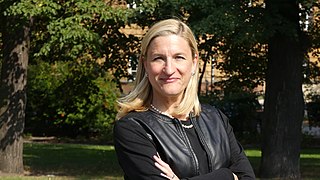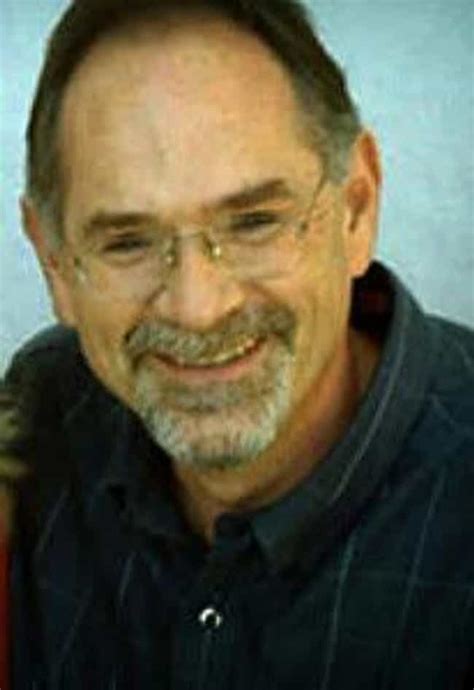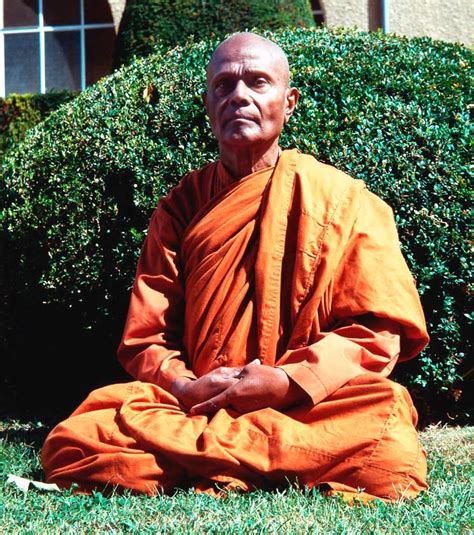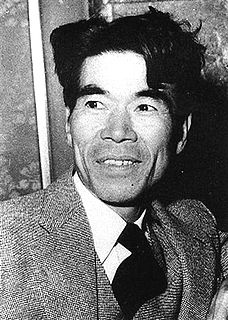Top 1117 Stream Quotes & Sayings - Page 19
Explore popular Stream quotes.
Last updated on December 21, 2024.
Give the best you have received from the past to the best that you may come to know in the future. Accept life daily not as a cup to be drained but as a chalice to be filled with whatsoever things are honest, pure, lovely, and of good report. Making a living is best undertaken as part of the more important business of making a life. Every now and again take a good look at something not made with hands-a mountain, a star, the turn of a stream. There will come to you wisdom and patience and solace, and above all the assurance that you are not alone in the world.
Think of the sound you make when you let go after holding your breath for a very, very long time. Think of the gladdest sound you know: the sound of dawn on the first day of spring break, the sound of a bottle of Coke opening, the sound of a crowd cheering in your ears because you're coming down to the last part of a race--and you're ahead. Think of the sound of water over stones in a cold stream, and the sound of wind through green trees on a late May afternoon in Central Park. Think of the sound of a bus coming into the station carrying someone you love. Then put all those together.
Every act of motherhood contains a dual intent, as the mother holds the child close and prepares it to move way from her, as she supports the child and stands it firmly on its own feet, and as she guards it against danger and sends it out across the yard, down by the stream, and across the traffic-crowded highway. Unless a mother can do both - gather her child close and turn her child out toward the world - she will fail in her purpose.
Dancing and building are the two primary and essential arts. The art of dancing stands at the source of all the arts that expressthemselves first in the human person. The art of building, or architecture, is the beginning of all the arts that lie outside the person; and in the end they unite. Music, acting, poetry proceed in the one mighty stream; sculpture, painting, all the arts of design, in the other. There is no primary art outside these two arts, for their origin is far earlier than man himself; and dancing came first.
Sri Yukteswar used to poke gentle fun at the commonly inadequate conceptions of renunciation."A beggar cannot renounce wealth," Master would say. "If a man laments: 'My business has failed; my wife has left me; I will renounce all and enter a monastery,' to what worldly sacrifice is he referring? He did not renounce wealth and love; they renounced him!"Saints like Gandhi, on the other hand, have made not only tangible material sacrifices, but also the more difficult renunciation of selfish motive and private goal, merging their inmost being in the stream of humanity as a whole.
Until one is committed, there is hesitancy, the chance to draw back, always ineffectiveness. Concerning all acts of initiative and creation, there is one elementary truth the ignorance of which kills countless ideas and splendid plans: that the moment one definitely commits oneself, then providence moves too. All sorts of things occur to help one that would never otherwise have occurred. A whole stream of events issues from the decision, raising in ones favor all manner of unforeseen incidents, meetings and material assistance which no man could have dreamed would have come his way.
Trout fisherman often give away their presence to the fish by the equipment they are wearing. The yo-yo hanging on the fly fishing vest that attaches to the hemostats or line clippers is often plated with chrome, giving off flashes of light. Some fly boxes that you wear on the chest are also bright aluminum-not a good idea. I recently fished with a fellow who wore a bright yellow hat on a meadow stream in Pennsylvania. From 100 yards away you could see his every movement,-I'm sure that trout near him could, too.
When you lose the story that's running like a golden stream underneath all the other stories, you're left with the idea that the Bible is a collection of random-seeming stories about various Bible characters that we're supposed to learn lessons from - almost like an Aesop's Fables. And a book of rules that God wants us to keep so he will love us. And we lose the glorious truth of the Bible that we were loved before even the beginning of time. That God had a plan. That no matter what, he would never stop loving us.
Then Nuvoletta reflected for the last time in her little long life and she made up all her myriads of drifting minds in one. She cancelled all her engauzements. She climbed over the bannistars; she gave a childy cloudy cry: Nuee! Nuee! A lightdress fluttered. She was gone. And into the river that had been a stream . . . there fell a tear, a singult tear, the loveliest of all tears . . . for it was a leaptear. But the river tripped on her by and by, lapping as though her heart was brook: Why, why, why! Weh, O weh! I'se so silly to be flowing but I no canna stay!
Sometimes by a woodland stream he watched the water rush over the pebbled bed, its tiny modulations of bounce and flow. A woman's body was like that. If you watched it carefully enough you could see how it moved to the rhythm of the world, the deep rhythm, the music below the music, the truth below the truth. He believed in this hidden truth the way other men believed in God or love, believed that truth was in fact always hidden, that the apparent, the overt, was invariably a kind of lie.
I learned that Canadians are furious because Canada is exporting water to the United States. Their lakes are shrinking because they're selling water to the U.S. We water our golf courses and every ice cream shop and every coffee shop in the country because the health inspector has said you have to have a steady stream of water cleaning your spoons that you're frothing milk with and their ice cream scoopers. Are you kidding me? We're wasting all this water while we're sucking it from Canada and they're watching their lakes shrink?
Just imagine the banner headlines if a marine biologist were to discover a species of dolphin that wove large, intricately meshed fishing nets, twenty dolphin-lengths in diameter! Yet we take a spider web for granted, as a nuisance in the house rather than as one of the wonders of the world. And think of the furore if Jane Goodall returned from Gombe stream with photographs of wild chimpanzees building their own houses, well roofed and insulated, of painstakingly selected stones neatly bonded and mortared! Yet caddis larvae, who do precisely that, command only passing interest.
But the truth, he knows, is otherwise. His pleasure in living has been snuffed out. Like a leaf on a stream, like a puffball on a breeze, he has begun to float towards his end. He sees it quite clearly, and it fills him with (the word will not go away) despair. The blood of life is leaving his body and despair is taking its place, despair that is like a gas, odourless, tasteless, without nourishment. You breathe it in, your limbs relax, you cease to care, even at the moment when the steel touches your throat.
Our life runs down in sending up the clock. The brook runs down in sending up our life. The sun runs down in sending up the brook. And there is something sending up the sun. It is this backward motion toward the source, Against the stream, that most we see ourselves in, The tribute of the current to the source. It is from this in nature we are from. It is most us.
Deep attention, the cognitive style traditionally associated with the humanities, is characterized by concentrating on a single object for long periods (say, a novel by Dickens), ignoring outside stimuli while so engaged, preferring a single information stream, and having a high tolerance for long focus times. Hyper attention is characterized by switching focus rapidly among different tasks, preferring multiple information streams, seeking a high level of stimulation, and having a low tolerance for boredom.
Gone were but the Winter,
Come were but the Spring,
I would go to a covert
Where the birds sing;
Where in the whitethorn
Singeth a thrush,
And a robin sings
In the holly-bush.
Full of fresh scents
Are the budding boughs
Arching high over
A cool green house:
Full of sweet scents,
And whispering air
Which sayeth softly:
We spread no snare;
Here dwell in safety,
Here dwell alone,
With a clear stream
And a mossy stone.
Here the sun shineth
Most shadily;
Here is heard an echo
Of the far sea,
Though far off it be.
How much is enough? How much does anyone require? Can I be both kind and tough? Can I put faith before desire? Right now, for all time, I vow to try . . . I volunteer to be simple, I volunteer to love, Every living thing like a mountain stream that flows out o'er the land. I volunteer for the journey from here to heaven's gate. I will do my part I place my heart in Your gracious hands . . . How then shall we live? Let us live lightly as a feather. How much shall we give? Let us give everything, together One heart, one mind, all humankind... I volunteer.
He was weary of himself, of cold ideas and brain dreams. Life a poem? Not when you went about forever poetizing about your own life instead of living it. How innocuous it all was, and empty, empty, empty! This chasing after yourself, craftily observing your own tracks--in a circle, of course. This sham diving into the stream of life while all the time you sat angling after yourself, fishing yourself up in one curious disguise or another! If he could only be overwhelmed by something--life, love, passion--so that he could no longer shape it into poems, but had to let it shape him!
The books of the great scientists are gathering dust on the shelves of learned libraries. And rightly so. The scientist addresses an infinitesimal audience of fellow composers. His message is not devoid of universality but its universality is disembodied and anonymous. While the artist's communication is linked forever with its original form, that of the scientist is modified, amplified, fused with the ideas and results of others and melts into the stream of knowledge and ideas which forms our culture. The scientist has in common with the artist only this: that he can find no better retreat from the world than his work and also no stronger link with the world than his work.
We do not realize how deeply our starting assumptions affect the way we go about looking for and interpreting the data we collect. We should recognize that nonhuman organisms need not meet every new definition of human language, tool use, mind, or consciousness in order to have versions of their own that are worthy of serious study. We have set ourselves too much apart, grasping for definitions that will distinguish man from all other life on the planet. We must rejoin the great stream of life from whence we arose and strive to see within it the seeds of all we are and all we may become.
Listening to her, one experienced a deep uneasiness as of having avoided an urgent responsibility, like someone who, walking at night along the banks of a stream, catches a glimpse in the water of a white face or a moving limb and turns quickly away, refusing to help or to search for help. We all see the faces in the water. We smother our memory of them, even our belief in their reality, and become calm people of the world; or we can neither forget or help them. Sometimes by a trick of circumstances or dream or a hostile neighborhood of light we see our own face.
He sits in an old armchair in the corner covered with bits of blankets and a bucket behind the chair that stinks enough to make you sick and when you look at that old man in the dark corner you want to get a hose with hot water and strip him and wash him down and give him a big feed of rashers and eggs and mashed potatoes with loads of butter and salt and onions.I want to take the man from the Boer War and the pile of rags in the bed and put them in a big sunny house in the country with birds chirping away outside the window and a stream gurgling.
Every now and then, I'll meet an escapee, someone who has broken free of self-centeredness and lit out for the territory of compassion. You've met them, too, those people who seem to emit a steady stream of, for want of a better word, love-vibes. As soon as you come within range, you feel embraced, accepted for who you are. For those of us who suspect that you rarely get something for nothing, such geniality can be discomfiting. Yet it feels so good to be around them. They stand there, radiating photons of goodwill, and despite yourself you beam back, and the world, in a twinkling, changes.
A person cannot coast along in old destructive habits year after year and accept whatever comes along. A person must stand up on her own two legs and walk. Get off the bus and go get on another. Climb out of the ditch and cross the road. Find the road that s where you want to go. ... The only sermon that counts is the one that is formed by our actions. She would quit drinking and thereby show Kyle life is what you make it. A person can grab hold of her life and change things for the better. This happens all the time. We are not chips of wood drifting down the stream of time. We have oars.
Andrius turned. His eyes found mine. I'll see you he said. My face didn't wrinkle. I didn't utter a sound. But for the first time in months I cried. Tears popped from their dry sockets and sailed down my cheeks in one quick stream. I looked away. The NKVD called the bald man's name. Look at me wispered Andrius moving close. I'll see you he said. Just think about that. Just think about me bringing you your drawings. Picture it because I'll be there.
The seasons, like greater tides, ebb and flow across the continents. Spring advances up the United States at the average rate of about fifteen miles a day. It ascends mountainsides at the rate of about a hundred feet a day. It sweeps ahead like a flood of water, racing down the long valleys, creeping up hillsides in a rising tide. Most of us, like the man who lives on the bank of a river and watches the stream flow by, see only one phase of the movement of spring. Each year the season advances toward us out of the south, sweeps around us, goes flooding away to the north.
He picked up the letter Q and hurled it into a distant privet bush where it hit a young rabbit. The rabbit hurtled off in terror and didn’t stop till it was set upon and eaten by a fox which choked on one of its bones and died on the bank of a stream which subsequently washed it away. During the following weeks Ford Perfect swallowed his pride and struck up a relationship with a girl who had been a personnel officer on Golgafrincham, and he was terribly upset when she suddenly passed away as a result of drinking water from a pool that had been polluted by the body of a dead fox.
In fact, if you take any group of scores, it's likely that fifty to sixty percent are going to be so much alike that it's difficult to tell any difference among them. But I sometimes wonder if that has more to do with the quality of the art that's being made. There are always those composers who are going to move toward whatever is currently in fashion, there are others who will deliberately attempt to go in another direction. And sometimes, there are composers who will see themselves as being outside the stream and not even try to present their music to the general public.
It was true what Jim said, this wasn’t the end but the beginning. But the wars would end one day and Jim would come then, to the island they would share. One day surely the wars would end, and Jim would come home, if only to lie broken in MacMurrough’s arms, he would come to his island home. And MacMurrough would have it built for him, brick by brick, washed by the rain and the reckless sea. In the living stream they’d swim a season. For maybe it was true that no man is an island: but he believed that two very well might be.
Tell me the word that will win you, and I will speak it. I will speak the stars of heaven into a crown for your head; I will speak the flowers of the field into a cloak; I will speak the racing stream into a melody for your ears and the voices of a thousand larks to sing it; I will speak the softness of night for your bed and the warmth of summer for your coverlet; I will speak the brightness of flame to light your way and the luster of gold to shine in your smile; I will speak until the hardness in you melts away and your heart is free.
The years... when I pursued the inner images were the most important time of my life. Everything else is to be derived from this. It began at that time, and the later details hardly matter anymore. My entire life consisted in elaborating what had burst forth from the unconscious and flooded me like an enigmatic stream and threatened to break me. That was the stuff and material for more than only one life. Everything later was merely the outer classification, the scientific elaboration, and the integration into life. But the numinous beginning, which contained everything was then.
Of course my moods change, but the average is serenity. I have a firm faith in art, a firm confidence in its being a powerful stream which carries a man to a harbor, though he himself must do his bit too; at all events, I think it such a great blessing when a man has found his work that I cannot count myself among the unfortunate. I mean, I may be in certain relatively great difficulties, and there may be gloomy days in my life, but I shouldn't like to be counted among the unfortunate, nor would it be correct if I were.
If people want to watch that five hours [of stream show] on their own terms in their own schedule. It needs to work if somebody wants to stop after an hour and a half or stop after half an hour. People talk about it like food. Like, "I just want to let you know I'm saving it." They talk about it like pasta. "I'm saving it. I'm only going to have one a week." And I love the fact that everybody can have their own experience and I want to make sure that what we put out there works in as many ways as possible.
We usually do not look into what is really there in front of us. We see life through a screen of thoughts and concepts, and we mistake those mental objects for reality. We get so caught up in this endless thought-stream that reality flows by unnoticed. We spend our time engrossed in activity, caught up in an eternal flight from pain and unpleasantness. We spend our energies trying to make ourselves feel better, trying to bury our fears. We are endlessly seeking security. Meanwhile, the world of real experience flows by untouched and untasted.
To the Technocrats: Have mercy on us. Relax a bit, take time out for simple pleasures. For example, the luxuries of electricity, indoor plumbing, central heating, instant electronic communication and such, have taught me to relearn and enjoy the basic human satisfactions of dipping water from a cold clear mountain stream; of building a wood fire in a cast-iron stove; of using long winter nights for making music, making things, making love; of writing long letters, in longhand with a fountain pen, to the few people on this earth I truly care about.
I get to live forever," he repeated. Luce was still lost, but he kept talking, a stream of words pouring out of his mouth. "I get to live, and to watch babies being born, and grow up, and fall in love. I watch them have babies of their own and grow old. I watch them die. I am condemned, Luce, to watch it all over again and again. Everyone but you." His eyes were glassy. His voice dropped to a whisper. "You don't get to fall in love--" "But...," she whispered back. "I've...fallen in love.
See, see how the sun has moved onward while we talked. Nothing can stop it in its course. Prayers cannot halt the revolving of nature. It is the same with human life. Victory and defeat are one in the vast stream of life. Victory is the beginning of defeat, and who can rest safely in victory? Impermanence is the nature of all things of this world. Even you will find your ill fortunes too will change. It is easy to understand the impatience of the old, whose days are numbered, but why should you young ones fret when the future is yours?





